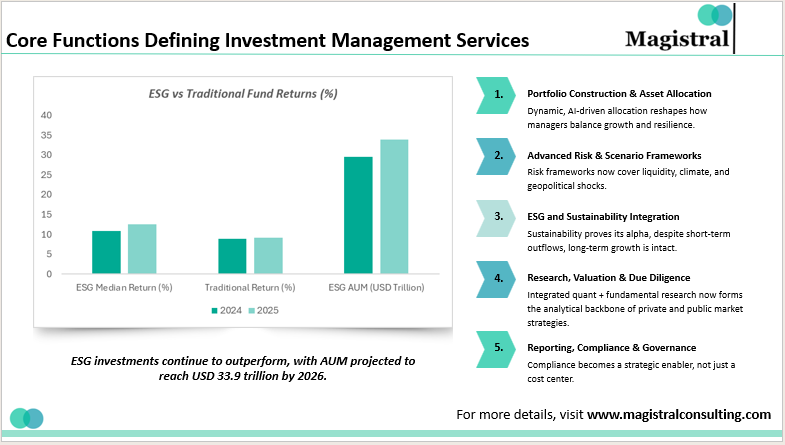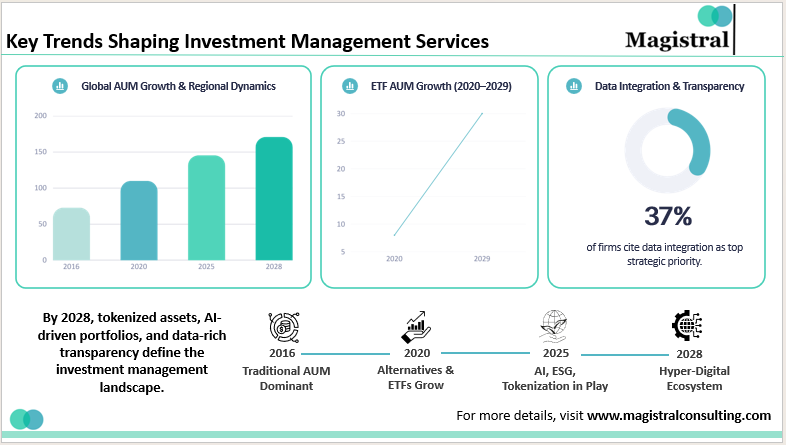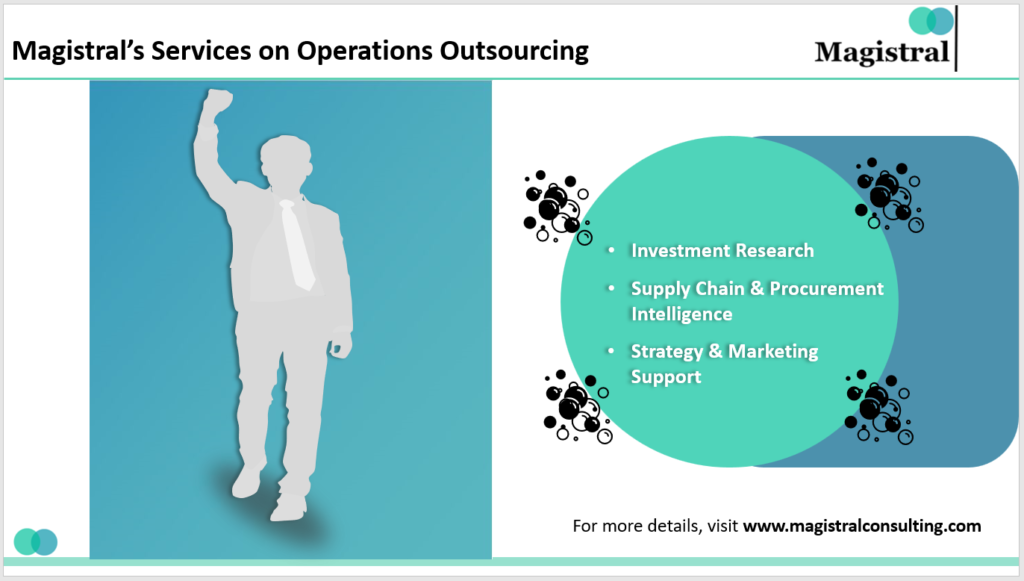By 2025, volatility will remain a feature of contemporary markets, shaped as it is by inflationary pressure, geopolitical uncertainty, changing regulation, and technological change. Investment management services now mean more than just portfolio construction; it comprises strategies built upon an integrated, governance-based approach that creates sustainable returns. With an estimated USD 145.4 trillion globally subject to professional management, an ever-growing function of investment management services is to help investors know how to invest when they are faced with complexity. Capital flows and risk regimes are changing, and investment management services will help institutions and individuals navigate uncertainty into growth opportunities.
The Escalating Role of Investment Management Services in 2025
With increasing market complexity and investors’ ever-growing aspirations, investment management services are now more essential than ever.
Demand from Institutions and Affluent Clients
Large institutions including pension funds, insurers, sovereign wealth funds are increasingly without portfolio oversight and risk management by specialists. Deloitte’s 2025 outlook warns firms that do not incorporate new technologies or diversify their product offering may lag in an increasingly competitive environment. At the same time, high net worth individuals and family offices are looking for investments with bespoke solutions that integrate both traditional and alternative assets, while relying on service providers to help them utilize and monitor bespoke strategies, including modeling, structuring, and governance.
The Rise of Alternatives & Private Markets
Alternative assets have swiftly become a key element of nearly all institutional portfolios. In the McKinsey Global Private Markets Report 2025, although fundraising has been inconsistent, private markets keep attracting significant capital. Accessing alternative investment opportunities involves deep operations knowledge, valuation, and creation of aligned incentive structures, which are all part of a professional investment management offering.
Technology as the Catalyst
In 2025, generative AI, data engineering, automation, and blockchain have moved from pilot projects to mission-critical systems. Deloitte’s outlook envisions innovative firms that embrace AI in their distribution and operations will create separation from firms that do not. Beyond operations, data integration and transparency are strategic differentiators: according to BNY’s “Future of Asset Management” report, 37% of asset managers say integrating data sources is a top priority over the next 24 months.
Core Functions Defining Investment Management Services in 2025
To achieve the desired impact, investment management services include several integrated capabilities. Here is how each capability begins to evolve in 2025.

Core Functions Defining Investment Management Services
Portfolio Construction & Asset Allocation
Asset allocation will still be the lead indicator of portfolio results. Managers will overlay strategic, tactical, and regime-aware allocation decisions from equities, fixed income, alternatives, and liquidity. By 2025, some firms will be using dynamic allocation techniques that will use AI and regime-switching models to change exposures to reflect macro or sentiment changes.
Advanced Risk & Scenario Frameworks
Risk management is broadening beyond market risk to include liquidity, operational, regulatory, and climate risks. Asset managers plan to boost investment in advanced risk analytics by over 70% in 2025, with stress testing now covering inflation, supply-chain, climate, and geopolitical shocks to strengthen portfolio resilience.
ESG and Sustainability Integration
ESG has become a core construct rather than a mere adjunct. In January-June 2025, sustainable funds gave 12.5% as median returns in contrast to only 9.2% for their traditional counterparts, thereby proving the alpha potential of ESG. However, with altering volatilities, ESG funds saw outflows to the tune of USD 8.6 billion in Q1. Nevertheless, institutional ESG investments are expected to swell to USD 33.9 trillion by 2026, thereby steadily accounting for more than 21.5% of global AUM.
Research, Valuation & Due Diligence
The rigorous practice of fundamental and quantitative research is still core. In private markets, long-horizon value – 5 to 10 years – will depend upon the depth of due diligence, operations research, and proprietary models with state-of-the-art capabilities. In quant strategies, momentum, regime detection, and tail-risk models are already finding multiple uses when combined with ESG sentiment regimes into new innovative frameworks.
Reporting, Compliance & Governance
As regulatory scrutiny and investor demand for clarity and transparency expand, reporting and compliance become strategic assets. Firms are building proficient tech-based reporting engines and governance layers to enhance auditability, ESG metrics transparency, and fee disclosure. In 2025, compliance spend continues to rise as firms cope with the new pace and dynamics the regulatory space is creating across jurisdictions and more granular ESG rules.
Key Trends Shaping Investment Management Services
Several macro- and industry-level trends continue to reshape investment management services.

Core Functions Defining Investment Management Services
Global AUM Growth & Regional Dynamics
It is estimated that global AUM will be USD 145.4 trillion by 2025, an approximate doubling from levels in 2016. Looking further ahead, PwC predicts that global AUM will by 2028 reach USD 171 trillion, especially driven by alternative and tokenized assets.
Regionally:
North America remains the largest, underpinned by strong institutional flows.
Europe is innovating concerning ESG and sustainable finance, which also brings new regulations demanding deeper disclosures.
Asia-Pacific is currently the fastest-growing region on the back of increasing wealth and the foundation of institutional capital expansion. Major AUM growth expected from Asia in the projection by PwC.
ETF & Passive Vehicle Expansion
Global ETF AUM grew by 27% in 2024, reaching USD 14.6 trillion, and is projected to grow more than double to 30 trillion by 2029. The increasing release of passive and semi-passive vehicles tends to contrast the older standing traditional active managers, as such, expecting a justification of values from these newer real-time offerings, insights, and nimbleness.
Consolidation, M&A, and Outsourcing
From the industry consolidation perspective, it is going premium as firms seek scale in distribution, infrastructure, and alternatives. PwC states that activity in deals will rebound in 2025, while smaller managers will outsource those non-core functions to focus on alpha and client relationships.
Data Integration & Transparency
Data remains the central heart. In 2025, organizations will prioritize integrating disparate systems, ensuring data lineage, and enabling end-to-end visibility. The firm capable of seamless external-internal data infusing ahead (market, ESG, sentiment, alternative) will enjoy a powerful advantage in insight and execution.
Strategies & Best Practices for Investment Management Providers
To be successful within investment management services, firms must take forward-thinking approaches built on flexibility, technology, and a client focus.
Multi-Asset & Regime-Aware Portfolios
Blending equities, bonds, alternatives, and liquid assets helps manage volatility. Regime detection (inflation, rate, or geopolitical shifts) enables dynamic allocation—using AI to de-risk in stress and capture upside in recovery.
Client-Centric Customization & Reporting
Clients demand tailored mandates- tax-aware, legacy-focused, ESG-tilted. Firms offering flexible, transparent reporting and personalized insights build stronger, longer-lasting relationships.
AI, Automation & Model Scaling
AI enhances execution, optimization, risk, and client engagement. While 60% of firms use AI in distribution, only 11% scale it deeply. Success starts with pilots, data governance, and strong model validation.
ESG as Strategy, Not Add-on
Sustainability is integral to portfolio design and risk management. Firms now embed ESG into thematic and transition strategies, focusing on clarity, metrics, and resilience amid volatile flows.
Outlook for Investment Management Services (2025–2028)
Investment management services are likely to develop in response to macro trends, changing client preferences, and advances in technology.
Democratization of Alternatives
Digital platforms will democratize retail access to previously closed alternative asset classes –fractional private credit, tokenized real estate, and niche strategies.
AI-First Decision Architectures
We may see predictive analytics, scenario engines, and AI-based optimization increasingly form the basis of selection allocation decisions, although there may be some human decision-making involved. Traditional firms that develop these AI-first practices will make it harder for incumbents.
ESG Scrutiny & Verification
With pressure from regulators and investors for accountability, sustainability claims will need to be scrutinized. Disclosure, third-party verifications, and metrics to validate impact will be necessary.
Cross-Border Capital & Emerging Market Growth
Emerging markets are becoming sources of capital and destinations for capital. Managers with more local presence and offerings may start to find new flows in Asia, Latin America, and Africa.
Magistral collaborates with investment firms to offer a complete suite of investment management services. They are research and valuations, AI-based analytics, ESG analysis, fund administration, outsourced CFO, and compliance capabilities. By shifting operational burden, we allow clients to focus on strategy, growth, and investor relations. This helps in improving resilience, scalability, and international competitiveness.
About Magistral Consulting
Magistral Consulting has helped multiple funds and companies in outsourcing operations activities. It has service offerings for Private Equity, Venture Capital, Family Offices, Investment Banks, Asset Managers, Hedge Funds, Financial Consultants, Real Estate, REITs, RE funds, Corporates, and Portfolio companies. Its functional expertise is around Deal origination, Deal Execution, Due Diligence, Financial Modelling, Portfolio Management, and Equity Research
For setting up an appointment with a Magistral representative visit www.magistralconsulting.com/contact
About the Author

Prabhash Choudhary is the CEO of Magistral Consulting. He is a Stanford Seed alumnus and mechanical engineer with 20 + years’ leadership at Fortune 500 firms- Accenture Strategy, Deloitte, News Corp, and S&P Global. At Magistral Consulting, he directs global operations and has delivered over $3.5 billion in client impact across finance, research, analytics, and outsourcing. His expertise spans management consulting, investment and strategic research, and operational excellence for 1,200 + clients worldwide

